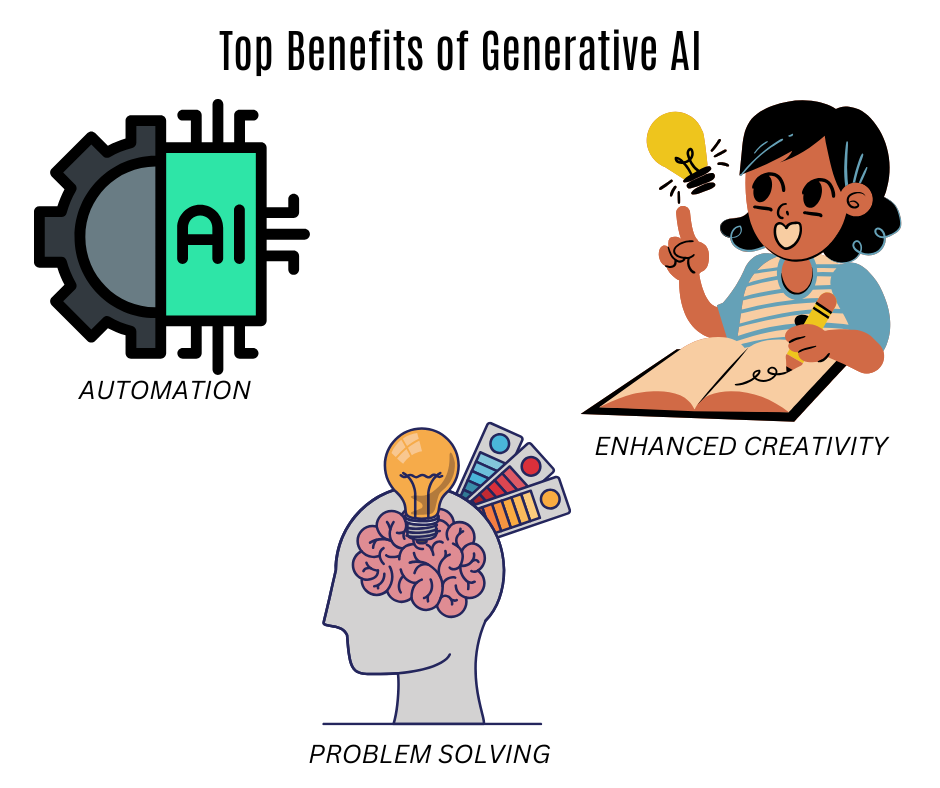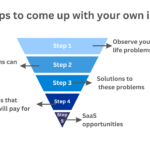Gen AI use cases refer to computer algorithms that create content, including text, images, and even music. It’s becoming more popular in the tech industry because it can automate creative tasks, save time, and increase productivity.
Gen AI use cases are a game-changer for businesses. It helps them innovate, streamline operations, and enhance customer experiences. Companies are using it to generate marketing content, design products, and even write code. The impact is significant. Businesses can do more with less effort, standing out in competitive markets.
This blog will explore different Gen AI use cases. We’ll look into various applications across industries. From healthcare to entertainment, we’ll see how generative AI transforms these sectors.
Gen AI Use Cases by Industry
Healthcare
Gen AI is transforming healthcare. It aids in drug discovery by creating new molecular structures and speeding up the research process. Researchers also use it to generate synthetic data, providing a safe environment to test hypotheses without risking patient privacy. Additionally, Gen AI use cases help in personalizing patient treatment plans by analyzing vast amounts of data to suggest the most effective treatments.
Finance
In the finance sector, generative AI plays a crucial role. It assists in fraud detection by analyzing transactions in real-time and identifying suspicious patterns. Gen AI use cases also provide valuable insights through predictive analysis, helping businesses make informed decisions. Moreover, it automates various processes like report generation, saving time and reducing errors.
Marketing & Advertising
Gen AI is a game-changer in marketing and advertising. It helps create engaging content such as blogs, emails, and social media posts. It also supports customer engagement strategy development by analyzing consumer behavior and suggesting effective strategies. Furthermore, generative AI enables personalized advertising campaigns by crafting ads tailored to individual preferences.
Entertainment
In the entertainment industry, Gen AI fuels creativity. It aids in scriptwriting by generating dialogues and storylines. It also contributes to video creation and editing, making the process more efficient. Additionally, game developers use Gen AI to create dynamic environments and characters, enhancing the gaming experience.
Innovative Business Applications Gen AI use cases
Generative AI is becoming a game-changer for businesses aiming to stay ahead of the competition. It helps companies in various ways, from enhancing product design to boosting operational efficiency. Let’s explore some key applications.
- Product Design: Gen AI can analyze market trends to help create unique and innovative product designs. By predicting what consumers want, businesses can tailor their products effectively.
- Demand Forecasting: It’s crucial to anticipate market demand accurately. Gen AI uses data to forecast product demand, minimizing waste and optimizing inventory management.
- Operational Efficiency: By streamlining internal processes, generative AI improves efficiency. It helps automate repetitive tasks, allowing employees to focus on what truly matters.
The role of Gen AI doesn’t stop there. It’s also integral to developing smart assistants for enhanced customer experiences. These assistants handle customer queries, recommend products, and guide users—personalizing interactions like never before.
Embracing generative AI, startups and large corporations alike are seeing remarkable benefits. For example, startups use AI to develop niche products, while big firms apply it to automate complex global operations, showing just how versatile this technology can be.
Exciting Gen AI Use Cases, Ideas and Inspirations
Generative AI isn’t just for current trends; it’s also opening doors for the future. Let’s explore creative ideas for Gen AI in new products and services.
- Content Creation: Use AI to write blogs, scripts, or even music. Automate marketing content that’s still engaging and personalized.
- Art and Design: Generate artwork or fashion designs with AI. It can help artists in brainstorming processes and exploring unique styles.
- Virtual Reality Worlds: Create immersive virtual environments for games or educational experiences using generative AI.
- Personalized Learning: Develop AI-driven tutoring systems that adapt to individual learning styles and needs.
- Product Design: Use AI to simulate and optimize new product models before actual production.
Besides these ideas, there are emerging trends and potential future applications that could further transform industries:
- Healthcare: AI can personalize treatment plans based on patient data and generate realistic simulations for medical training.
- Finance: Use AI to predict market trends, automate trading processes, and enhance customer service.
- Entertainment: Develop AI-generated movies or interactive storytelling experiences that engage audiences personally.
- Retail: Customize product recommendations and generate virtual try-on experiences for customers.
These are just starting points. We invite you to brainstorm and share your own innovative gen AI use cases. Together, let’s push the boundaries of what’s possible with this exciting technology!
Challenges and Considerations in Gen AI use cases
Implementing generative AI brings fantastic opportunities. But businesses face challenges too. Let’s talk about some common issues and how to deal with them.
Ethical Concerns
Generative AI can produce amazing results. However, ethical concerns arise. It’s crucial to ensure the AI doesn’t replicate harmful stereotypes or create inappropriate content.
Data Privacy
Data privacy is a big concern. Generative AI needs a lot of data to function well. Businesses must protect user data and comply with regulations like GDPR.
Potential Biases
Bias in AI systems can lead to unfair outcomes. Biases can sneak in through the data you use. Always aim for diverse data sets to minimize this risk.
Tips for Overcoming Challenges
- Establish a clear ethical framework. This guides AI development and use.
- Regularly audit systems. Identify and correct biases.
- Stay updated on data privacy laws. Make compliance a priority.
Guidelines for Small Businesses
- Start small. Implement generative AI in areas where impact is measurable.
- Use open-source tools. They often have large user communities and lots of support.
- Seek expert advice. A consultant can help tailor AI solutions to your needs.
By understanding these challenges and how to tackle them, businesses can harness the full potential of generative AI.
Conclusion: The Future of Generative AI in Business
Generative AI is revolutionizing various business sectors with its innovative potential. We’ve explored numerous general AI use cases, highlighting how it can enhance creativity, efficiency, and automation.
The transformative power of generative AI is vast, touching every industry from healthcare to entertainment. As technology advances, its applications will only grow, reshaping how businesses operate and innovate.
Stay informed about the latest trends in generative AI. Consider how you can leverage this powerful tool to unlock new opportunities and drive growth in your own business. The future of generative AI is exciting, and being proactive could make all the difference.


